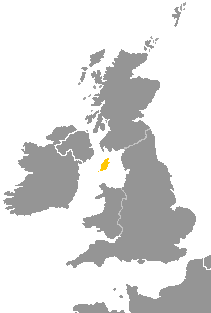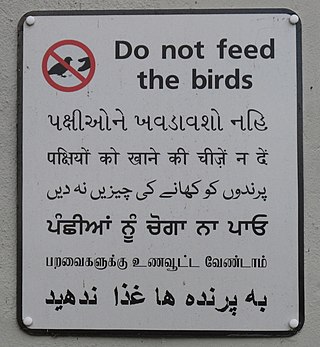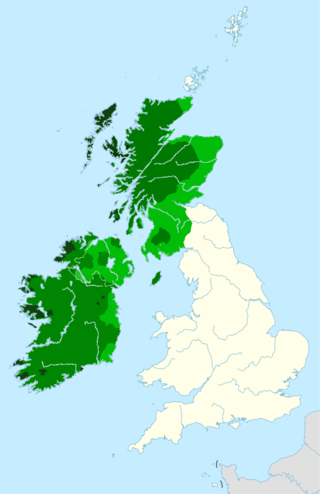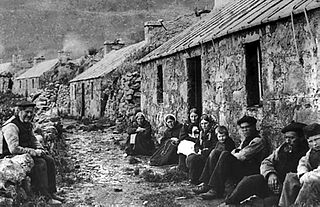See also
- Language revitalization
- Celtic Revival, overlapped with the Gaelic revival
- Gaelic (disambiguation)
The Gaelic revival was the late-nineteenth-century revival of interest in the Irish language and Irish Gaelic culture.
Gaelic revival may also refer to:
The Goidelic or Gaelic languages form one of the two groups of Insular Celtic languages, the other being the Brittonic languages.

Manx, also known as Manx Gaelic, is a Gaelic language of the insular Celtic branch of the Celtic language family, itself a branch of the Indo-European language family. Manx is the historical language of the Manx people.

Scottish Gaelic, also known as Scots Gaelic and Gaelic, is a Goidelic language native to the Gaels of Scotland. As a Goidelic language, Scottish Gaelic, as well as both Irish and Manx, developed out of Old Irish. It became a distinct spoken language sometime in the 13th century in the Middle Irish period, although a common literary language was shared by the Gaels of both Ireland and Scotland until well into the 17th century. Most of modern Scotland was once Gaelic-speaking, as evidenced especially by Gaelic-language place names.
Gaelic is an adjective that means "pertaining to the Gaels". As a noun it refers to the group of languages spoken by the Gaels, or to any one of the languages individually. Gaelic languages are spoken in Ireland, Scotland, the Isle of Man, and Canada.

English, in various dialects, is the most widely spoken language of the United Kingdom, but a number of regional and migrant languages are also spoken. Regional indigenous languages are Scots and Ulster Scots and the Celtic languages, Irish, Scottish Gaelic, Welsh and, as a revived language with few speakers, Cornish. British Sign Language is also used. There are also many languages spoken by immigrants who arrived recently to the United Kingdom, mainly within inner city areas; these languages are mainly from continental Europe and South Asia.

The Celtic Revival is a variety of movements and trends in the 19th, 20th and 21st centuries that see a renewed interest in aspects of Celtic culture. Artists and writers drew on the traditions of Gaelic literature, Welsh-language literature, and so-called 'Celtic art'—what historians call Insular art. Although the revival was complex and multifaceted, occurring across many fields and in various countries in Northwest Europe, its best known incarnation is probably the Irish Literary Revival. Irish writers including William Butler Yeats, Lady Gregory, "Æ" Russell, Edward Martyn, Alice Milligan and Edward Plunkett stimulated a new appreciation of traditional Irish literature and Irish poetry in the late 19th and early 20th century.
Erse or Earse may refer to:
Celticism may refer to:
The Manx are an ethnic group originating on the Isle of Man in the Irish Sea in northern Europe. Their native culture has significant Norse-Gaelic, Celtic, and English influences. The Manx language descends from Middle Irish.
Gaelicisation, or Gaelicization, is the act or process of making something Gaelic, or gaining characteristics of the Gaels, a sub-branch of celticisation. The Gaels are an ethno-linguistic group, traditionally viewed as having spread from Ireland to Scotland and the Isle of Man.

The languages of Scotland are the languages spoken or once spoken in Scotland. Each of the numerous languages spoken in Scotland during its recorded linguistic history falls into either the Germanic or Celtic language families. The classification of the Pictish language was once controversial, but it is now generally considered a Celtic language. Today, the main language spoken in Scotland is English, while Scots and Scottish Gaelic are minority languages. The dialect of English spoken in Scotland is referred to as Scottish English.
Language movement or Language Movement may refer to:

McGowan is an Irish and Scottish surname. It is an Anglicization of the Irish Mac Gabhann and Scottish surname Mac Gobhann. Belonging to the Uí Echach Cobo, located in modern-day County Down in the east of Ulster, they produced several over-kings of Ulaid. By the late 12th century, the English had expelled the McGowans to Tír Chonaill in the west of Ulster.
Colin is an English-language masculine given name. It has two distinct origins:
Gaelic literature is literature in the vernacular Gaelic languages of Ireland, Scotland and the Isle of Man.

Irish, also known as Gaelic, is a Goidelic language of the Insular Celtic branch of the Celtic language family, which is a part of the Indo-European language family. Irish is indigenous to the island of Ireland and was the population's first language until the 19th century, when English gradually became dominant, particularly in the last decades of the century. Today, Irish is still commonly spoken as a first language in areas of Ireland collectively known as the Gaeltacht, in which only 2% of Ireland's population lived in 2016. It is also spoken by a larger group of habitual but non-traditional speakers, mostly in urban areas where the majority are second-language speakers.

The Gaels are an ethnolinguistic group native to Ireland, Scotland and the Isle of Man. They are associated with the Gaelic languages: a branch of the Celtic languages comprising Irish, Manx and Scottish Gaelic.

The Scots are an ethnic group and nation native to Scotland. Historically, they emerged in the early Middle Ages from an amalgamation of two Celtic-speaking peoples, the Picts and Gaels, who founded the Kingdom of Scotland in the 9th century. In the following two centuries, the Celtic-speaking Cumbrians of Strathclyde and the Germanic-speaking Angles of north Northumbria became part of Scotland. In the High Middle Ages, during the 12th-century Davidian Revolution, small numbers of Norman nobles migrated to the Lowlands. In the 13th century, the Norse-Gaels of the Western Isles became part of Scotland, followed by the Norse of the Northern Isles in the 15th century.
Lismore may refer to:
Status of the Gaelic language may refer to: